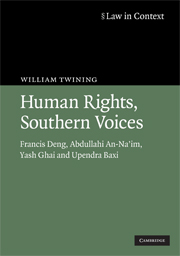2 - Francis Mading Deng
Published online by Cambridge University Press: 05 June 2012
Summary
Introduction
Francis Mading Deng was born in 1938 near Abyei in Kordofan in the West of the Sudan. His father, Deng Majok, was paramount chief of the Ngok Dinka, the only Nilotic inhabitants in the Northern Sudan. It is commonly said that “Abyei is to the Sudan as the Sudan is to Africa”, a bridge between the African and Arab worlds. Deng Majok was an outstanding tribal leader, a national figure, especially prominent for his bridging role between the Arab North and the Nilotic South. He was also known as the creator of a huge family through marrying more wives than any other man in Dinka history. Francis, one of his senior sons, became both the leading interpreter of Dinka tradition and a committed proponent of human rights, maintaining that they are basically compatible. How could this be?
Francis was the eldest son of Deng Majok's fourth wife. Although he did not groom any of his sons to succeed him, Deng Majok believed in education. The education of Francis Deng is a story of a remarkable journey through different cultures. It began in his father's compound in Abyei and continued in a boarding school for sons of chiefs run on similar lines to a British preparatory school, then at a secondary boarding school in the North, where the great majority of the boys were Muslims. He read law at the University of Khartoum, where he was taught in English, mainly by expatriate teachers, including myself.
- Type
- Chapter
- Information
- Human Rights, Southern VoicesFrancis Deng, Abdullahi An-Na'im, Yash Ghai and Upendra Baxi, pp. 4 - 52Publisher: Cambridge University PressPrint publication year: 2009



